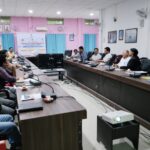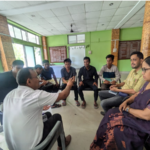SAIKH MD SABAH AL-AHMED
“Education is the ability to listen to almost anything without losing your temper or your self-confidence.” ― Robert Frost
Once upon a time food, shelter and clothing formed the basic needs of human beings. However, with the development in the industrial age, another important factor that got added up to the list of basic needs was education. It’s through education only that transmission of tradition and culture, running of politics and economy is made possible.
Education is one of the most powerful instruments for reducing poverty and social disparity. Education is equally a key to enhance India’s competitiveness in the global economy. Therefore, ensuring access to quality education for all, in particular for the deprived poor and rural population, is central to the economic and social development of India. Education is a powerful tool by which economically and socially marginalized adults and children can lift themselves out of poverty and participate actively in the socio-economic process of the country.
Education is a fundamental human right and essential for the exercise of all other human rights. It promotes individual freedom and empowerment and yields important development benefits. Yet millions of children and adults remain deprived of educational opportunities, many as a result of poverty. The right to education is regarded as universal and inviolable. The International Covenant on Economic, Social and Cultural Rights (1966) (ICESCR) states that education is essential for the growth, protection and enhancement of the human personality, and in a broader sense, in the fight against poverty and other social injustices. According to international standards, all children are entitled to free compulsory primary education, while States have an obligation to develop secondary education and responsibility for developing measures to make it accessible for all children.
Education plays an important role in shaping our future. No matter it is criticized but it is still vital in our existence. Education is not only the theories, principles and concepts of subjects but more importantly it is the way to live life. It is not the memorization of theories but the understanding of the situation in proper perspective. Education is not the problem of scoring marks but it is the solution of human and worldly problems. A child deprived of education is just like a child deprived of mother. The efforts must be made to ensure quality education for children and youth of our country.
Education can definitely set you apart from others in terms of your knowledge, understanding and soft skills like communication and the manner of presenting yourself before others. But what we need in our education and society is the inculcation and practice of values and ethics. The future of any country belongs to its youth and the youth will have the challenge to free or overcome the problem of corruption and dishonesty faced by our country. We are in process of transformation from agrarian to industrialized economy. There will be lot of job opportunities in manufacturing and service sector. Indian economy with the development of financial market and huge consumer base also offers the opportunities for entrepreneurship. The future is bright for youth provided they imbibe proper skills with physical fitness and mental toughness. Youth needs to be mentally tough to face the challenges of life. Studies and examination are only the small part of bigger challenges to be faced in future. It’s is one’s education which determines one’s altitude in life.
As a nation whose growth is the talk of the town, quality education in India still remains a distant dream. A lot has been written about the system of education in this country. A lot of questions have been raised against it – are we doing the right things for progress, is our research output anywhere near other nations of our league and in spite of having bright minds and enough numbers on our side we have failed to produce proportionate number of Nobel laureates.
The quality of the ‘quality education’ system in India has been lagging for quite some time now in comparison to the quantity. In the coming time, few changes are expected regarding the matters of transparency and norms. The educational institutes in India would need to fulfill certain basic norms. The institutions are expected to participate more into information sharing and of course accountability. The upcoming educational institutes are expected to be trend setters in adopting several standards related to the quality of education.
The education sector in India has received significant attention from different quarters like the investors, policymakers, intellectuals and media. Education is the groundwork based on which any country can progress and develop. Without educated personnel, sustenance of a vibrant economy is not possible. Some of the recent trends in education are quite apparent while others are still to make its presence felt. One way you can master the change is by spotting the trends and keeping yourself flexible enough to get ready for the changes. At the time of adoption of the Constitution in 1950, the aim was to achieve the goal of Universalisation of Elementary Education (UEE) within the next ten years i.e. by 1960. It is also indeed wonderful that mid day meal scheme and Right to Education Act (RTE) have actually achieved a lot, but standards of what constitutes education are problematic themselves.
The RTE and the mid day meal scheme seem like mere buzzwords, but the real truth is that we can’t just stop with these laws alone, we just cannot afford to have children in schools just because they are getting a meal or fulfilling a law. Mid-day meal and Right to Education are indeed important but equally important is THE RIGHT EDUCATION and we just have to find ways and means to ensure quality education for our younger generation, so as to transform themselves into quality human resources, who can go on to contribute positively towards the overall fabric of the economy.
(The writer is an author, poet, lyricist as well as a columnist of The Assam Tribune, and is presently a faculty member at the Department of Social Sciences, Don Bosco School, Panbazar, Guwahati. He can be reached at sabahalahmed@gmail.com)







